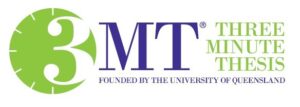2024 3MT Competition
Congratulations to the winners!
FIRST PLACE: Danielle Daniels, Education
RUNNER-UP: Eliya Tazreena Tashbib, Chemical Engineering
PEOPLE’S CHOICE: Paige Nicklas, Neuroscience/Neurobiology and Anatomy
Sub Heat Winners: Elizabeth Plunk, Toxicology and Michal Shaposhnikov, Pharmacology/Physiology

